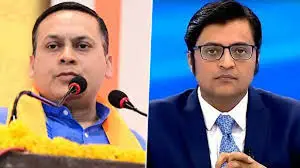‘Habitual offenders’: Congress files complaints against Malviya, Goswami for defaming party

The Indian National Congress recently filed complaints against BJP IT Cell Head Amit Malviya and Republic TV Editor-in-Chief Arnab Goswami. The complaints were submitted in Delhi and Bengaluru. They accuse Malviya and Goswami of spreading false information to defame the Congress party. This move reflects growing concerns about how media and social platforms are used to manipulate public opinion.
False Claims About Congress’ Presence in Turkey
The allegations center on a claim made by Malviya and Goswami. They said the Istanbul Congress Centre in Turkey is an official office of the Indian National Congress. The Congress party strongly denies this. They say the claim is false and intended to damage their reputation. The party sees this as a deliberate effort to malign key leaders, including Rahul Gandhi. According to Congress, this misinformation aims to create a misleading narrative linking the party to foreign locations in a negative way.
Congress Takes Legal Action
In response, Congress filed complaints with law enforcement agencies. They demanded a thorough investigation and strict action against Malviya and Goswami. The party called them “habitual offenders” who often spread misleading information to harm political rivals.
Senior Congress leader Jairam Ramesh called this a “criminally motivated campaign” to discredit the party. He urged authorities to treat this case as a national priority. Ramesh stressed the dangers misinformation poses in today’s political environment.
Republic TV’s Correction and Malviya’s Counterclaim
After the complaints, Republic TV issued a correction. They said the image linking Congress to the Istanbul Congress Centre was used by mistake due to a “technical error.” The channel clarified that the image was unrelated to the broadcast content. This was an effort to address the concerns raised.
However, Amit Malviya fired back at Congress. He asked why the party opened an office in Turkey in 2019 if the claim was false. Malviya noted that Turkey has supported Pakistan on the Kashmir issue at the United Nations. This counterclaim added fuel to the ongoing dispute between the parties.
Political Background: Media Battles and Misinformation
This case reflects the highly competitive and often heated political climate in India. Media channels and social platforms are now key battlegrounds where political narratives are shaped. These platforms influence how the public views politicians and parties.
Republic TV, led by Arnab Goswami, is known for its aggressive support of the BJP government. Amit Malviya plays a key role in shaping BJP’s online narrative. Meanwhile, Congress fights back, accusing rivals of misinformation and character attacks.
In recent years, many legal cases have involved defamation and fake news claims. These battles highlight the challenge of maintaining truthful political discourse amid instant information sharing and polarization.
Legal and Ethical Issues
Congress’ decision to file complaints shows how political parties can use legal channels to fight defamation. Indian law allows individuals and organizations to seek justice if false statements damage their reputation.
At the same time, this raises questions about freedom of speech and journalistic responsibility. There is an ongoing debate about where to draw the line between criticism and defamation. While holding politicians accountable is important, it must not suppress free expression.
The investigation will test whether the legal system can handle political defamation cases fairly. It also stresses the need for clear guidelines on media ethics and political speech.
Public Reactions and Wider Impact
The complaints against Malviya and Goswami have sparked intense media coverage and public discussion. Congress supporters back the complaints. They see them as necessary to protect the party’s reputation.
On the other side, BJP supporters and Republic TV’s audience view the complaints as politically motivated. They accuse Congress of trying to silence opposition and limit free speech.
This incident highlights the growing influence of media in politics. It shows the risks when misinformation is used as a political weapon. The case also emphasizes the need for media literacy, regulation, and transparent journalism.
Conclusion: The Need for Media Ethics in Politics
The Congress party’s complaints against two prominent political media figures highlight the overlap between media, misinformation, and politics. Political actors increasingly use digital platforms to sway public opinion. This puts pressure on the limits of responsible communication.
This case will attract attention for its legal outcomes and its impact on media conduct. It raises questions about political accountability and democratic debate in India. Congress’ call for strict action against “habitual offenders” reflects a demand for better ethics in political communication.
In a democracy, balancing reputation protection with free speech is vital. This dispute reminds all stakeholders to handle these challenges carefully. Only then can public discourse remain fair and trustworthy.






